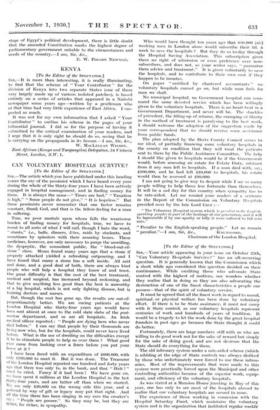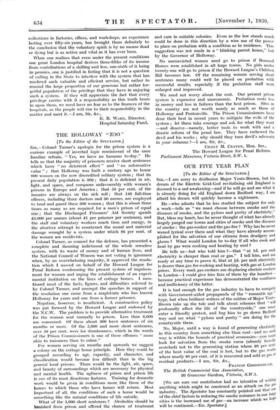[To the Editor of the SPECTATOR.]
SIR,—Your article appearing in your issue on October 25th, "Can Voluntary Hospitals Survive?" has an oft-recurring question. It is generally known that the Commission which a short while ago considered this question decided on their continuance. While crediting those who advocate State control with the highest of motives, one wonders whether they realize that in doing so they arc also advocating the destruction of one of the finest characteristics a people can possess—that of the spirit of voluntary service.
It must be agreed that all the finest work in regard to moral, spiritual, or physical welfare has been done by voluntary effort. If there is to be State assistance, it must not carry with it State control, as our voluntary hospitals represent centuries of work and hundreds of years of tradition. It would be a tragedy to let the work done by the great hospital founders in past ages go because the State thought it could do better.
Fortunately, there are large numbers still with us who are willing to do good work not for the sake of reward but simply for the sake of doing good, and are not desirous that the State should do everything for them.
The old infirmary system under a rate-aided scheme (which is nibbling at the edge of State control) was always disliked by those who unfortunately were forced to use these infirm- aries. Most of the improvements that were made to this system were practically forced upon the Municipal and other controlling authorities because of the superior work, equip- ment, and efficiency of the voluntary hospitals.
As was stated at a Mansion House ;meeting in May of this year, one has only to see most of the hospitals abroad to realize that our voluntary hospitals are second to none.
The experience of those working in connexion with the Hospital Saturday Fund, which maintains the voluntary system and is the organization that instituted regular weekly collections in factories, offices, and workshops, an experience lasting over fifty-six years, has brought them definitely to the conclusion that the voluntary spirit is by no means dead or dying but is as active and vital as it has ever been.
When one realizes that even under the present conditions one great London hospital derives three-fifths of its income from contributions of a shilling and less, one-sixth of it being in pennies, one is justified in feeling that it is not a question of calling in the State to interfere with the system that has rendered such valuable and efficient service, but rather to remind the large proportion of our generous but rather for- getful population of the privilege that they have in enjoying such a system. If they will appreciate the fact that every privilege carries with it a responsibility as this truth bears in upon them, we need have no fear as to the finances of the hospitals, as the people will rise to their responsibility in the matter and meet it.—I am, Sir, &c., E. B. WARD, Director, Hospital Saturday Fund.











































 Previous page
Previous page